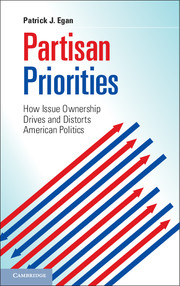6 - How Issue Ownership Distorts American Politics
Published online by Cambridge University Press: 05 August 2013
Summary
The previous two chapters have shown that rather than being driven by popular policies or superior performance, issue ownership instead derives from the fact that the Democratic and Republican parties prioritize different sets of issues. Evidence for these priorities are found in partisans’ beliefs and actions. In survey after survey, party elites and party voters say their parties’ owned issues are the nation’s most important problems and that they favor increased federal spending on them. When a party comes to power in Washington, its politicians convert these beliefs into action by devoting more major legislation and increased federal spending to the issues it owns.
If issue ownership’s effects were limited to this, we might consider the phenomenon as having at worst benign and perhaps even positive implications for American politics and policy making. Political scientists have long held that voters benefit to the extent that the parties’ stances are consistent and distinctive and thus party labels of candidates represent clear, easy-to-understand choices. The results from previous chapters show that issue ownership is a meaningful, accurate aspect of these labels. In this sense, issue ownership may help voters make choices aligned with their preferences – and in fact, this is precisely how scholars of issue ownership explain the finding that parties gain votes when their owned issues are more salient during national elections.
- Type
- Chapter
- Information
- Partisan PrioritiesHow Issue Ownership Drives and Distorts American Politics, pp. 172 - 211Publisher: Cambridge University PressPrint publication year: 2013

